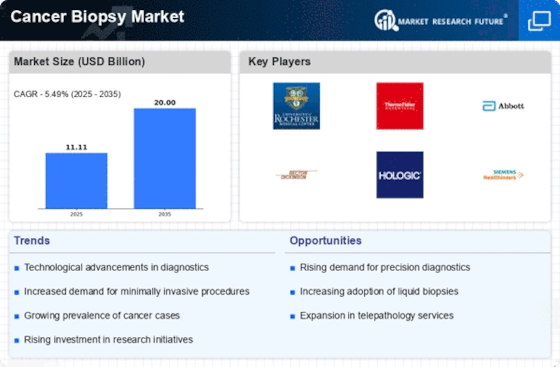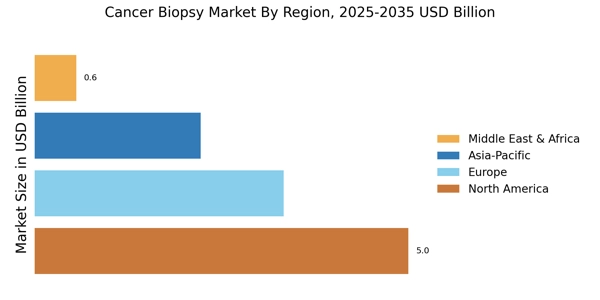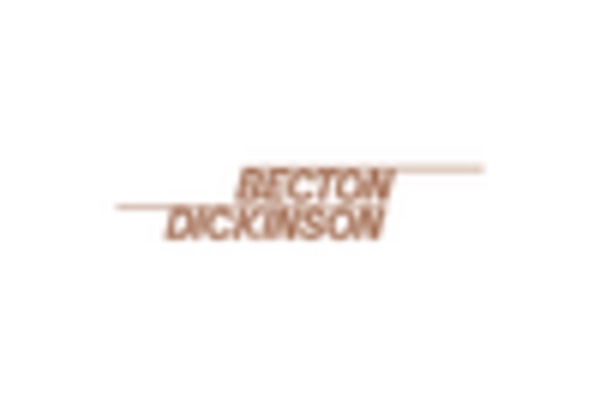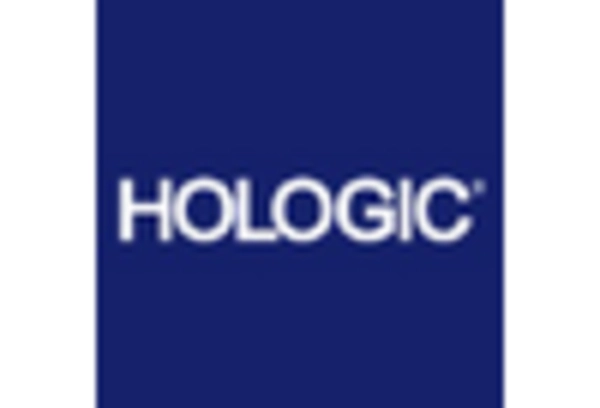Rising Incidence of Cancer
The increasing incidence of cancer worldwide is a primary driver for the Cancer Biopsy Market. According to recent statistics, cancer cases are projected to rise significantly, with estimates suggesting that by 2040, the number of new cancer cases could reach 27.5 million annually. This alarming trend necessitates advanced diagnostic tools, including biopsies, to ensure timely and accurate cancer detection. As healthcare systems strive to improve patient outcomes, the demand for various biopsy techniques, such as needle biopsies and surgical biopsies, is likely to surge. Consequently, the Cancer Biopsy Market is expected to expand as healthcare providers invest in innovative biopsy technologies to meet the growing need for effective cancer diagnosis.
Growth in Personalized Medicine
The shift towards personalized medicine is reshaping the Cancer Biopsy Market. Personalized medicine emphasizes tailored treatment plans based on individual patient profiles, which often necessitates precise diagnostic information obtained through biopsies. As targeted therapies become more prevalent, the need for accurate tumor characterization through biopsy samples is paramount. This trend is reflected in the increasing use of molecular profiling techniques, which rely on biopsy specimens to identify specific genetic mutations and inform treatment decisions. Consequently, the Cancer Biopsy Market is likely to experience growth as healthcare providers invest in advanced biopsy technologies that facilitate personalized treatment approaches, ultimately improving patient outcomes.
Increasing Awareness and Screening Programs
The growing awareness of cancer and the importance of early detection is significantly influencing the Cancer Biopsy Market. Public health campaigns and educational initiatives are encouraging individuals to participate in regular screening programs, which often include biopsy procedures for definitive diagnosis. For instance, breast cancer screening programs have led to an increase in the number of biopsies performed, as early detection is crucial for effective treatment. This heightened awareness is expected to drive demand for various biopsy methods, including fine-needle aspiration and core needle biopsies. As more individuals seek preventive care, the Cancer Biopsy Market is poised for substantial growth, with healthcare providers adapting to meet the rising demand for diagnostic services.
Technological Innovations in Biopsy Techniques
Technological advancements in biopsy techniques are transforming the Cancer Biopsy Market. Innovations such as liquid biopsies, which analyze circulating tumor DNA, are gaining traction due to their non-invasive nature and ability to provide real-time insights into tumor dynamics. Furthermore, advancements in imaging technologies, such as MRI and CT scans, enhance the precision of biopsy procedures, thereby improving diagnostic accuracy. The integration of artificial intelligence in pathology is also streamlining the analysis of biopsy samples, leading to faster and more reliable results. As these technologies continue to evolve, they are likely to drive growth in the Cancer Biopsy Market, attracting investments and fostering research initiatives aimed at improving cancer diagnostics.
Regulatory Support and Funding for Cancer Research
Regulatory support and increased funding for cancer research are pivotal drivers of the Cancer Biopsy Market. Governments and health organizations are recognizing the critical need for innovative cancer diagnostics and are allocating resources to support research initiatives. This funding often translates into the development of new biopsy techniques and technologies, enhancing the overall landscape of cancer diagnostics. Additionally, regulatory bodies are streamlining approval processes for novel biopsy methods, facilitating quicker access to advanced diagnostic tools. As a result, the Cancer Biopsy Market is likely to benefit from these supportive measures, fostering innovation and improving the availability of effective biopsy solutions for cancer patients.

















